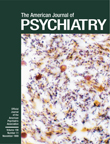Obsessive-Compulsive Disorder Symptoms Before and After Recovery From Bulimia Nervosa
Abstract
OBJECTIVE: Obsessive-compulsive disorder (OCD) symptoms are common in people who are ill with bulimia nervosa. However, little is known about whether OCD symptoms persist after long-term recovery from bulimia. METHOD: Thirty-one female patients with bulimia nervosa, 29 women who had been recovered from bulimia for more than 1 year, and 19 healthy female comparison subjects completed the Yale-Brown Obsessive Compulsive Scale, which measures OCD-like symptoms. Items related to symptoms of core eating disorders were omitted from the Yale-Brown scale. RESULTS: The Yale-Brown scale scores of the women with bulimia (mean=13.1, SD=10.6) and those who had recovered from bulimia (mean=7.9, SD=7.0) were significantly higher than the scores of the normal comparison subjects (mean=1.9, SD=2.6). Women with bulimia and those who had recovered from bulimia had similar Yale-Brown scale scores and endorsed similar Yale-Brown scale target symptoms, such as obsessions related to symmetry and exactness. CONCLUSIONS: OCD symptoms persist after recovery from bulimia. Moreover, the types of OCD symptoms experienced by bulimia patients do not vary dramatically with improvement in bulimic symptoms. Persistent OCD symptoms after recovery from bulimia raise the possibility that these behaviors are trait-related and contribute to the pathogenesis of bulimia.



